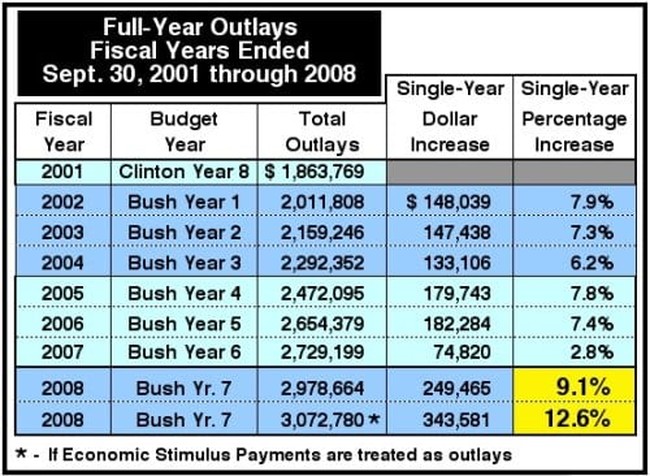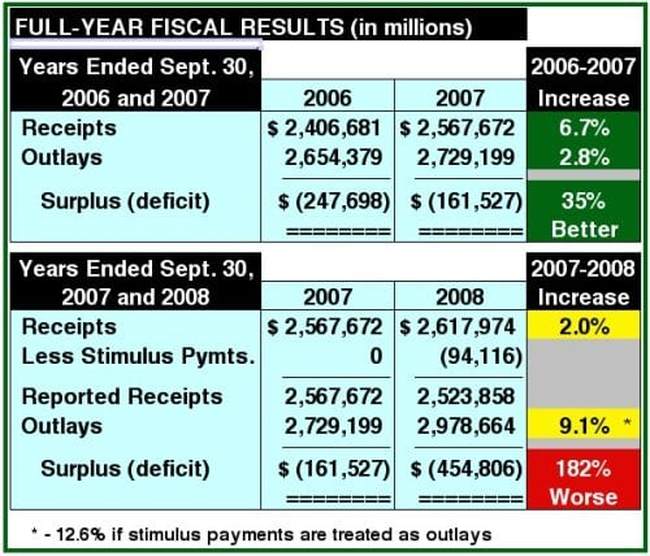There’s a reason the media, as shown here, glossed over the most basic elements of the full fiscal-year results for Uncle Sam when they were released last week: spending spiraled out of control more than any other single year during the Bush administration.
And guess who’s in charge? Is it a coincidence that the 2007-2008 fiscal year represents the first year for which the Pelosi-Obama-Reid (POR) Congress had full budget-passing responsibility? I think not. But the folks in charge of delivering the news don’t want us to get any crazy ideas while the attempted coronation of Barack Obama is in full swing.
Here is how federal spending has grown during the past seven fiscal years (the analysis starts in fiscal 2002, since the final budget passed during the Clinton administration covered the 2001 fiscal year; source data: 2007 and 2008, 2005 and 2006, 2003 and 2004, 2001 and 2002):
House Speaker Dennis Hastert’s rule during three Bush administration congressional terms has been portrayed as overindulgent and heavy on pork-barrel spending. That characterization is mostly accurate, though there is some justification for increases that occurred during the earlier years.
Fiscal 2002 was certainly affected by post-9/11 homeland security-related responses. Whether you agree with the decisions to fight them, the wars in Afghanistan and Iraq were certainly key components of the increases that took place in 2002 and 2003. But after that, the excuses for spending growth are pretty thin. It is not without reason that many inclined to support George Bush over John Kerry in 2004 held their noses in the voting booth.
Fiscal 2005 and 2006 were particularly odious. The Hurricane Katrina response was a blank check that generated staggering waste. Pork-barrel spending went into overdrive, culminating with a “Republican” senator, Ted Stevens, threatening to resign if he didn’t get his $200-plus million Bridge to Nowhere. (Mr. Stevens and the Alaska GOP may learn in two weeks that resignation would have been a marvelous idea.)
George Bush’s shared culpability for initiating and/or acquiescing to all of this should, of course, not be ignored. Time after time the president had chances — and failed — to pull out his veto pen.
Ironically, the final budget passed under Hastert and Senate GOP leader Bill Frist was relatively restrained. Spending rose barely more than inflation. But it was too little, too late, and voters in November 2006 decided that the Democrats couldn’t do any worse than the Republicans had.
Really?
Let’s look at how the POR triumvirate’s first full budget year panned out in comparison to Hastert and Co.’s final year:
The GOP Congress’s final-year discovery of spending control, coupled with a fourth consecutive year of robust growth in receipts driven by Bush’s supply-side tax cuts, narrowed the deficit by 35% in fiscal 2007. Further improvement seemed inevitable.
What a difference a year makes.
Pelosi, Obama, and Reid have been singing from the same tax-increasing, energy-obstructing, over-regulating hymnal since they took over in January 2007. The markets and the business community have taken notice, reining in employment, putting expansion plans on hold, and reducing tax receipt-generating economic activity.
On a seasonally adjusted basis, here is what job growth in the past five fiscal years ending September 30 has been:
Fiscal 2004 — 1.86 million
Fiscal 2005 — 2.48 million
Fiscal 2006 — 2.26 million
Fiscal 2007 — 1.31 million
Fiscal 2008 — minus 519,000
The case that this is all George Bush’s fault is very thin. It is hardly a coincidence that the first quarter of negative economic growth in over six years took place during the first quarter of Pelosi-Obama-Reid’s first budget. Regardless, the bottom line is that federal receipts have flattened out and appear destined to show year-over-year declines in the coming months.
Congress and the media kept telling us a slowdown was coming. Logically then, it should have reined in spending — and yes, George Bush should have brandished the veto pen more often. But the exact opposite has happened.
Blame it on the surge in Iraq? Hardly. Yes, total military spending increased from $528 billion to $595 billion, but that $67 billion increase is barely a quarter of the total spending increase of $249 billion — and at least the surge accomplished something.
Here are some of the departments that enjoyed double-digit spending increases: Department of Justice (13.6%), Department of Labor (24.2%), State Department (27.3%), Veterans Affairs (16.4%), Army Corps of Engineers (29.6%), Office of Personnel Management (10.2%), and NASA (12.4%). It appears that many of these agencies saw the POR triumvirate coming and decided it was time, literally, to party again like it was 1999.
Pelosi, Obama, and Reid all promise even more spending. The GOP spend-o-meter on Obama alone has documented nearly $1.3 trillion in new spending promises — generally spread over roughly four years — and the list of seemingly endless bailouts grows.
Someone had better remind the next president, whoever he is, and the next Congress, whoever is in charge, that the federal treasury is not a bottomless ATM machine. I fear that serious consequences lie just around the corner.











Join the conversation as a VIP Member